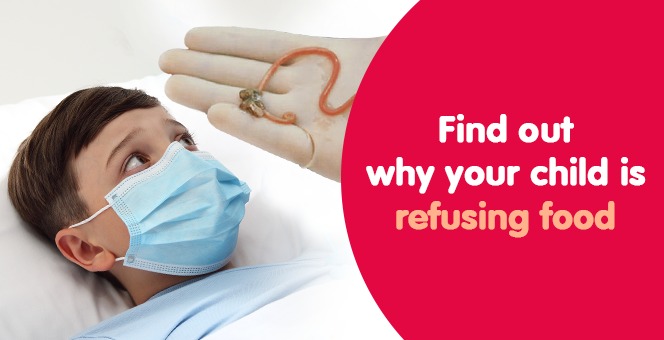Is your child running away from food the moment you serve it? Kids are often fussy eaters, and it can be difficult to feed them. It certainly can make you anxious if your little one doesn’t eat properly. But don’t worry, as long as it is not accompanied by significant weight loss for your fussy eaters. In fact, temporary loss of appetite is a common condition among children, but that doesn’t mean it is not a cause of concern.
Many parents usually complain about reduced appetite in their children. But sometimes it is a result of careless parenting mistakes. Some kids fill their stomachs with junk food at home or while frequenting a restaurant with their parents. Most parents ignore these mistakes which are in a way responsible for an appetite slump. For kids over a year old, appetite changes according to age, energy levels, and their body’s requirements.
Children are very good at responding to their feelings of hunger and fullness. It is important to trust your child’s appetite. It is normal for your kid’s appetite to change from day to day and from meal to meal. But in some cases, it could be a cause for concern. Here, Mommunity tells you about the possible reasons for the loss of appetite in children and ways to improve it that might help build it back.
WHEN SHOULD YOU WORRY?
If your child has normal weight and height (for their age), then there may not be a reason to worry, as some children with a small build may require less food and, therefore, a lesser appetite. During the phase of growth and development, it is important to make sure that your child is getting all the essential nutrients. But if you have to coerce your child to eat food with threats or bribes, there could be something wrong. If your fussy eaters child is older and there is a sudden loss of appetite, accompanied by weight loss or symptoms of illness, seeking medical attention from a pediatrician is recommended.
POSSIBLE REASONS FOR LOSS OF APPETITE IN CHILDREN
1. Illness: If your kid has a fever, sore throat, abdominal discomfort, or suffering from some other health condition, then they might eat less than usual. While your child is sick, they might suffer from a loss of appetite. In such a case, make sure to fight the disease, not the appetite.
2. Stress: Stress can have a negative impact, including loss of appetite, on young children. If your child is losing interest in eating or having a hard time sleeping, then they may be suffering from stress. To address your child’s poor appetite, you need to identify the root cause. Some common causes of stress during childhood are:
- Family issues like a death of a close one in the family
- Bullying
- Inability to manage through academic pressure and the impractical expectations of parents
3. Depression: We don’t talk much about childhood depression but it does exist. It makes the child an introvert, sad, and lose interest in a number of activities. These are the kind of kids who will not eat even if you try to bribe them with chocolates and savories.
4. Slow growth rate: Changes in growth can cause an appetite slump in children. During the first year, children grow rapidly. But after that, the growth decreases, and they may eat less food and a decline in appetite is perfectly normal during this period.
5. Medication: Antibiotics usually rob kids of their appetite. However, if the course of the medication is over and you still think that your child s appetite is not returning to normal it is better to visit the pediatrician.
6. Constipation: If your child is unable to pass motions and doesn’t have a bowel movement for two to three days at a stretch it is obvious that their digestive system is not working properly, fussy eater, which is why they are unable to eat their meals, fussy eaters.
7. Lack of exercise: If your munchkin hesitates to go outside and play, and wishes to be sedentary most of the time, he isn’t going to be very hungry at mealtime.
8. Snacking between meals: Eating junk food and drinking high-sugar beverages between meals also contributes to appetite loss.
9. Anemia: Children suffering from anemia are usually weak, fatigued, and irritable. A deficiency of iron in their diet also makes them fussy and they refuse to have food given to them.
10. Intestinal worms: Intestinal worms might cause a loss of appetite. Worms might enter your kid’s digestive system and cause intestinal bleeding, appetite loss, diarrhea, fatigue bloating, unexplained weight loss, etc.
TIPS TO ENHANCE YOUR CHILD’S APPETITE:
Serving Water Before the Meal: By consuming water an hour before each meal can be favorable as it helps the organs to process the food.
Letting them Play: Rather than making your child a prisoner at their own home, let them play and go outside the house. By performing physical activities, the metabolism increases leading to a better appetite.
Serve small portions frequently: Children have smaller stomachs as compared to adults. They do not eat as much at meals. Five or six smaller meals or snacks may better fulfill your child’s caloric needs.
Begin with Lemon Juice: Lemon juice is a great way to activate the digestive system. Serving a glass of lemon juice can lead to an increase in the appetite of children.
Peanuts for Snacks: Peanuts are one of the scientifically proven food items that help in increasing the appetite of children. You could always use them as snacks so that your child can have a good dinner before they head back to bed.
Serving their Favorite Meal: One of the pro-parenting tips is to never pick a fight with your child regarding what they want to eat. At times it’s better to serve them what they desire.




